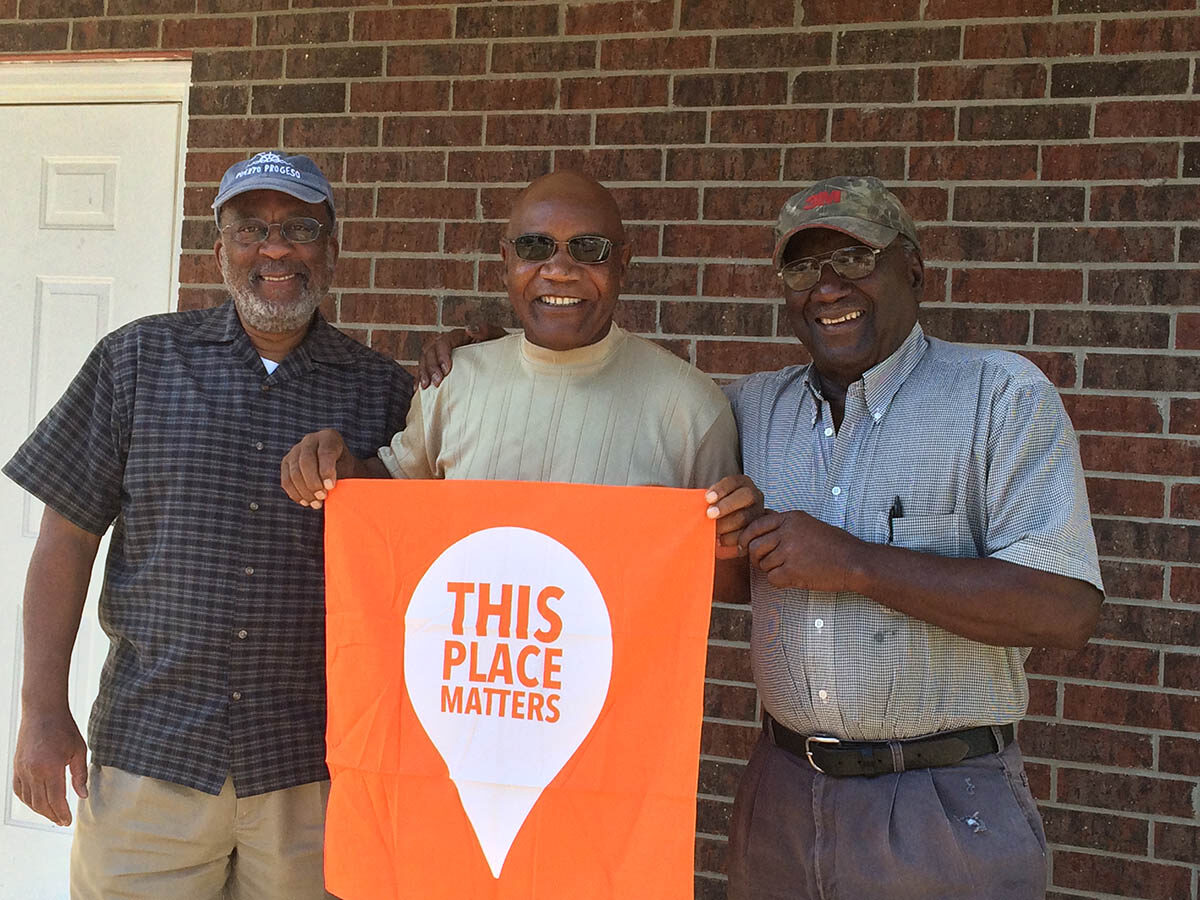Rachel Dorothy Tanur Memorial Lecture: Andrea Roberts, “The Community Core: Making and Keeping Place Heritage in Texas’s Freedom Colonies”

"This Place Matters," a photo by Andrea Roberts. Image, L to R. Henry Hadnot, Fred McCray, Bobbie Joe Hadnot, founders of The Community and Family Historical Preservation Association standing in front of the historic, George Washington Carver School located in Dixie Community, a freedom colony in Jasper County, Texas. The School has since been transformed into a community event center.
| Registration Information |
|---|
| The GSD’s Fall 2021 Public Programs are all virtual and require registration.
The event will also be live streamed to the Harvard GSD YouTube page. Only viewers who are attending the lecture via Zoom will be able to submit questions for the Q+A. If you would like to submit questions for the speaker in advance of the event, please click here.
Live captioning will be provided during this event.
|
Event Description
In Texas’ freedom colonies — African American settlements founded 1866-1930 — descendants of community founders engage in heritage conservation by keeping folklife, sacred rituals, and other cultural expressions that sustain communities’ Black sense of place. However, rural, vernacular African American placekeeping strategies are rarely framed in planning and architectural history as transgressive or expressions of Black liberation. Presenting an excerpt from her forthcoming book, Never Sell the Land, Dr. Roberts shares case studies in which descendants of Deep East Texas freedom colony founders leverage heritage conservation to revitalize community cores. In contrast with urban cores defined by density and transit, the author conceptualizes freedom colony cores as embodied, rhizomatic, and dynamic. Placekeeping descendants, who live simultaneously in urban and rural Black settlements, act as interstices between freedom colony full and part-time residents, contest local land-use decisions, and rehabilitate properties. Heritage conservation activities sustain the diaspora of descendants’ commitment to and financial support of homestead rehabilitation, land retention, and adaptive reuse of a segregation-era school. The author will share ways freedom colony descendants co-opt, subvert, and reinvent community cores to resist placelessness and create “free Black space.”
Following Dr. Roberts’ presentation, she will be joined by current Loeb Fellow, Monica Rhodes for a discussion.
Speakers

Dr. Andrea Roberts is Director of The Texas Freedom Colonies Project™ and an Assistant Professor of Urban Planning, and co-founder of the African American Digital Humanities Working Group at Texas A&M University (TAMU). She is also a fellow with TAMU’s Hazard Reduction and Recovery Center, Center for Heritage Conservation, Institute for Sustainable Communities, and the Africana Studies Program. Dr. Roberts holds a Ph.D. in community and regional planning from The University of Texas at Austin (2016), where her specialization areas were African diaspora studies and historic preservation. She also holds an M.A. in government administration from the University of Pennsylvania (2006) and a B.A. in political science from Vassar College (1996). Her 12 years of nonprofit management, community development, and government administration experience inform her efforts to move disappearing African American communities — facing sprawl, gentrification, and resource extraction — from the margin to the center of public discourse, pedagogy, and research.
Her research frames planning & historic preservation practices as avenues to social justice. Her scholarship and digital humanities platforms tell the story of freedom colonies, African American settlements founded after Juneteenth in Texas between 1865-1930. The Journal of Planning History, Buildings and Landscapes, the Journal of the American Planning Association, the Journal of Community Archaeology and Heritage, Planning Theory & Practice, and Environmental Justice have published her peer-reviewed scholarship on Black planning history, cultural landscape theory, Black feminist preservation, and participatory preservation. Her commentary has also appeared in Newsweek, The Conversation, and the National Trust for Historic Preservation’s Leadership Forum.
She is also a 6th generation Texan, whose ancestors were formerly enslaved and founded freedom colonies. In 2014, she founded The Texas Freedom Colonies Project. The Project’s student researchers, volunteers, and the freedom colony diaspora contribute to The TXFCP Atlas, a publicly accessible map and database containing descendants’ memories, images, and reports on contemporary life in nearly 400 settlements. The Texas Department of Transportation and the Council of Texas Archeologists use the platform to identify Black historic resources at risk.
Dr. Roberts is also the Consultant/Owner of Freedom Colonies Project, LLC, which provides research design support and DEIA workshops for preservation organizations. She is a Texas State Board of Review member and a National Monument Audit Advisory Board member. She has received awards for her engaged scholarship from The Vernacular Architecture Forum and the Urban Affairs Association. Dr. Roberts is a 2020-21 Whiting Public Engagement Fellow and was a 2020 Visiting Scholar at Yale’s Gilder Lehrman Center for the Study of Slavery, Resistance, Abolition. Currently, she’s writing a book about Black historic preservation practice for The University of Texas Press.
Follow Dr. Andrea Roberts on Twitter and and follow the Texas Freedom Colonies Project on Facebook.
 Monica Rhodes is the former director of Resource Management at the National Park Foundation. In this role, Rhodes oversaw facility and construction grant-making to the National Park Service and helped lead efforts to develop strategies for African American and Latinx engagement.
Monica Rhodes is the former director of Resource Management at the National Park Foundation. In this role, Rhodes oversaw facility and construction grant-making to the National Park Service and helped lead efforts to develop strategies for African American and Latinx engagement.
Prior to her role at NPF, Rhodes was the founding director of the National Trust’s HOPE (Hands-On Preservation Experience) Crew, which was created to expand the preservation movement to a younger, more diverse audience. In the five years of leading HOPE Crew, Rhodes guided over 165 preservation construction projects, trained 750 young people and veterans, and engaged 3700 volunteers in large-scale community events. Under her leadership, the program garnered more than 1 billion media impressions and supported $18 million of preservation work, primarily in national parks. Before joining the Trust, Rhodes worked as a consultant to preservation non-profits.
Rhodes’ work has been featured in national outlets like PBS NewsHour, Huffington Post, Washington Post, and U.S. News & World Report. She also appeared in a feature spread on women in the preservation movement in Essence Magazine’s Spring 2018 issue. Separate from her work with NPF, Rhodes served on the Commission for Historical and Architectural Preservation and the Market Center Community Development Corporation board in Baltimore City. She also served as an advisor for the DC LGBTQ Historic Context Study and a project reviewer for the Facilities and Buildings grant program for the DC Commission on the Arts and Humanities.
Rhodes earned her undergraduate degree in History at the University of Tulsa and a Master’s degree in African American Studies at Temple University. She also attended the University of Pennsylvania where she received a Master’s degree in Historic Preservation.
Anyone requiring accessibility accommodations should contact the Public Programs Office at (617) 496-2414 or [email protected].
#GSDEVENTS